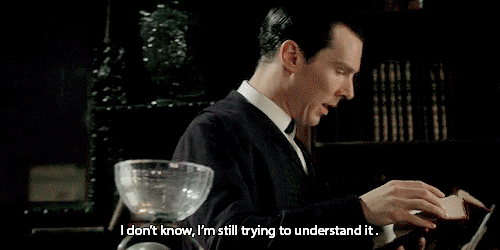Text
WHAT PRACTICE MAKES
The good thing about being in robot mode is you get to channel all that into things like old hobbies. Let’s be honest, I’m probably not gonna post in a long time, after this.

So, everyone knows the saying: “practice makes perfect”, and if you hadn’t heard of it, there you go. When it comes to deduction and most things, practice is essential. What you practice is nearly irrelevant. When you practice, getting warmer— consistency is key. However, I wanna talk about how you practice.

If you’ve circulated the deduction community, you’ll see all these pioneer deductionists who have years and years, maybe even decades of experience. Are all of them good? Not really. A person doing it for 6 months could get better results than them, but why? Why, after all these years are some deductionists still inadequate after so much experience?
The truth is, practice does not exactly make perfect, it makes normal.
These deductionists are practicing incorrectly. They go on reddit or facebook and deduce people, maybe go out in real life and get their material there and simply assume they’re right. They have no confirmation. Now, this may seem a little ironic, but I don’t believe in people getting involved in your process. You only need yourself, and whoever your deducing (or the extension of them, like their belongings). Unfortunately, this means you have to socialize and do research.
Don’t just assume you’re right.
Whenever you’re deducing someone, make sure you have them there, available to confirm and deny.
Don’t just ask what you got right and wrong. Try to explore why it is you were wrong, what set them apart from the baseline.
When you get a lucky, improbable deduction, still ask which factors contributed to this phenomenon. Ask, ask, ask.
How do you ask? Just be as mysterious and ominous, then direct as possible. That’s the 1-2-step. Be enticing and mysterious, then tell the truth. I go on whisper or reddit. I make a post that goes: “I bet you I could tell you who you are by seeing a picture of you or anything you own. NO NUDES OR FOOT PICS.”
Just being honest about that last part. People get confused.
So, what’s the moral of the story? Practice makes normal, perfect practice makes progress. I am coining that and you all have to monetarily compensate me whenever you use that, thanks. This is a pretty short post, but if you have any questions, feel free to ask them. I’ve got nothing going on in my life and I may just throw myself into deduction, who knows? This may be my renaissance, or something.
TDP

#deduction#bbc sherlock#sherlockbbc#deductive reasoning#deductive logico#logicalreasoning#science of deduction#deduce#reasoning#sherlock holmes#mystery
8 notes
·
View notes
Note
Who is your favourite deductionist in media and in real life?
Of course, Sherlock has to be there. Raymond Holt’s surprisingly good + more realistic. In real life, I don’t really know. I’ve heard good things about Ben Cardall. I also feel obligated to say that I’m my own biggest fan and that I am, in fact, my favorite deductionist in real life.
I’d love to hear your own answers, too. It’d be nice to explore more deduction-related media.
23 notes
·
View notes
Text

It's my 6 year anniversary on Tumblr 🥳
Thanks to those who stuck around :)
9 notes
·
View notes
Text
How To Get Accurate But Interesting Deductions
Note: I’m working on…working on a little project on deduction, I think it’ll be pretty interesting, once finished. It’s a pretty laborious one that requires the collection of information and a lot more bullshit, so…you probably won’t be seeing that, anytime soon.

Okay, so back to the topic: How to get accurate but interesting deductions. This is very broad. Honestly, I chose this title because I knew that the kind of people who’d be attracted to it would probably be the ones who need to hear it. Some phrases these people may use while reasoning:
“Because they’re an idiot”
“Because they want to impress potential romantic partners”
“Because they’re slow”
“Because they’re shallow”
“They’re mentally unwell *insert mental illness here*”
If you find yourself saying these things, then you probably need to read this post. Humanization: it’s important. I’m not here to be the morality police, or whatever— it’s just a fact.

Do you want to stop getting the same, surface level, inaccurate, blanket statement deductions? Then deduce people, not a version of your projections. If you haven’t guessed, I lean more towards the psychological aspect of deduction, and I’ve gathered that humanizing the people you deduce will help you psychologically profile them.
The thing is, deductionists sometimes underestimate or dehumanize the people they’re deducing. Whether they do it to feel better about themselves, to force a more interesting story onto their person in order to come up with more exciting conclusions, or whatever they’ve got going on, doesn’t matter. The point is, they don’t think other people are allowed to be intelligent, or substantial and interesting.
As a deductionist, one of the worst things you can do is judge the person you’re deducing. It’s not your job to judge them, you’re supposed to be analyzing them.
Your projections and clumsy methodology will only get in the way of that. When you deduce them, give your person a chance. Give them as much justice as you would want to be done onto you. If you want accurate deductions, then actually treat people like…people. Look for meaning in everything, then just discard the ones that don’t fit into the picture— it’s better than missing a piece.

For example, a person I was deducing, along with others, had an old blanket with cartoons on it. Here’s how one person went wrong:
Cartoon blanket—> immature, possibly autistic/ADHD, not many friends.
Can’t they just be young or sentimental?
Either attached to childhood, looking for comfort, or financially unstable?
No books—> stupid, shallow, immature.
E-books are a thing. His book could’ve been in his locker, at school, or hell, in his backpack in another room.
Shoes inside the room—> messy, no parents at home, slob.
Could be, or it could be a matter of convenience. It could be a matter of routine. Or, he could have extracurriculars and has to be somewhere, after. He could have a social thing, which would go against the whole “no friends, loser” thing.
When you deduce someone, treat it like a courtroom inside your head. There are two attorneys, the defense, and the prosecutor. One person looks for meaning, stretches and bends over backwards to redeem your person, while the other just goes buckwild and absolutely shits all over their little head. It’s called balance.
People are allowed to be as smart and interesting, maybe even moreso, than you. People are allowed to be complex.
Anyways, I know I neglect this blog a lot. In my defense, you hit a certain plateau, when you’ve been deducing for a while. I don’t know when I’ll upload again, but…ya’ll eatin’ today. Bye.

24 notes
·
View notes
Text
EXERCISE
This is gonna be a quick post.
I know this cool thinking exercise that isn’t exclusively for deduction, and I’m not sure where I read it from, but it’s really effective.
Think of 100 different ways to use a toothpick—> it doesn’t have to be a toothpick, could be something else, but it’s really helpful when it comes to creative thinking.
If you wanna elevate it, go back to that list and reason out why it would work, and why it wouldn’t. This’ll help you with your reasoning skills.
That’s all for today, bye bye.
15 notes
·
View notes
Text
YOU CAN SEE THE DATE OF WHEN SOMEONE SENT AN ASK!! Ok, these were all super old but….that was still fun.
5 notes
·
View notes
Note
Ohhh i want you I don’t know if I need you but Ohhh i would die to find out Ohhh i want you I don’t know if I need you but Ohhh i would die to find out
Then Do It. Die.
2 notes
·
View notes
Note
What about us? What about all the times you said you had the answers? What about us? What about all the broken happy ever afters? What about us? What about all the plans that ended in disaster? What about love? What about trust? What about us?
ew
3 notes
·
View notes
Note
To make this conversation a bit more interesting I want to play a game. What does rot 13 times? Here's the answer, have fun: GungJnfCergglRnflJnfagVg?AbjVgfLbheZbirNtnva
“That was pretty easy, wasn’t it? Now it’s your move again”
Ok well, first of all, I’m insulted by how you just laid out the answer…
Next, I have no idea how old this is, but I’m gonna respond cause I’m bored
Lastly, what move? You’re gonna have to narrow it down cause we all know there are many ways a person can move 😉
I will assume that you’re irrevocably in love with me and that all your messages are attempts to win me over. THATS my move. You can’t stop this, you dug this grave. You chose this path.
1 note
·
View note
Text
Also, if you’re gonna send song lyrics or something to troll me, DM me yourselves, cowards. I get invested. Best believe I will finish the job. Let’s be trolls together. Let’s sing. Let’s dance, baby. Did you think I was fucking normal? Think again
4 notes
·
View notes
Text
I forgot how to check my inbox and finally found out how again…you’re all dead. It’s over for everyone
2 notes
·
View notes
Text
Denial
I’m a person who loves psychological deduction. I prefer working on a person’s psyche / personality rather than getting more physical, sherlockian deductions. If you happen to get your deductions confirmed, you’ll come across a few forks in the road, make a few mistakes, and that’s fine. Sometimes, though, you are completely correct and the problem lies in whoever you’re deducing, because they’re living in denial.
How will you be able to tell if you’re actually onto something or if you’ve made an error?
1.) self-awareness. Was that deduction really reasonable, or did you just want to feel better about yourself? Did you just want the drama, or were there pieces of evidence to support it? Check yourself.
2.) establish a baseline. Is it in the person’s behavior to be in denial about this? if yes, then…there you go!
3.) look for inconsistencies. Prod them a little, see how they react, emotionally.
4.) ask the right questions.
I’ve got two examples from two people i’ve deduced, one in denial, one I was incorrect about.
I deduced a girl in her teens who claimed I got everything correct, but one: that she cared about how people saw her and her looks. According to her, she didn’t. Of course, that was a lie.
Why? Here’s what I got (keep in mind that these were all confirmed)
- 13-16, female, stable economic status, not as comfortable as she liked.
- active online
- wants to be seen as funny, charming, someone intelligent, interesting, and with substance.
- strong personality, opinionated, rich inner world, yet introverted and shy.
- has older siblings that are perceived as either more attractive, intelligent, or both.
- complicated but alright relationship, closer to mother.
- lonely
- has trouble asserting herself.
- feels a lot of pressure to live up to her own and others’ expectations of her, academically, physically, behaviorally.
She claimed she didn’t care how she looked and what people thought of her and that I was wrong. I ended up being right, but we’ll get to that, later. Why did I stick to my guns?
- had on undetectable makeup, face covered with hair that was braided.
- fashion had a clear niche or message.
- psych profile: insecure, pressured, self-perception, trouble with assertion
—> Her psych profile, that she confirmed, all points to a certain pattern. What I knew about her was she was insecure, feeling pressured, wanted to seen as interesting, all that— but what’s the root cause of all this?
She draws a lot of her self-image from those around her.

Whether she wants to be pretty and smart enough or wants to prove she doesn’t care are not as important the fact that she feels she has something to prove to these people. There’s a difference between not caring and wanting to look like you don’t care. There’s a difference between thinking/being something, and wanting people to see you as that. Look for inconsistencies.
What about when I was wrong?
I deduced a girl and got:
- introverted
- young adult to teen female, around 17.
- artistic or creative, sketches or writes.
- very active online, expressive.
- very particular about self expression.
- outspoken
- insecure, specifically when it comes to the physical self.
- wants a sense of belonging, to be seen by the right people in the right ways.
- feels misunderstood.
- skeptic
- anxious
- closed off, emotionally distant and can be seen as cold or abrasive
- “I wouldn’t say you have a terrible reputation or relationship with people in your social circle, you may just not be involved enough.”
- your parents / family, I think may be an okay relationship? They’re not terrible, at the very least.

I got things wrong because of biases, honestly. The things she called out were reasonable.
introverted—> actually extroverted. I was led on by her activity online and the stereotypes that came with the “edgy-activist”, outspoken type.
relationship with parents—> i wanted to play safe and didn’t want to risk it, ironically, didn’t want to engage in stereotypes even if the answer was right there.
I also got her economic status slightly wrong, mainly because I got lazy/careless and didn’t want to offend her. I’ll admit, I didn’t have the balls and was biased.
Hindsight’s 20/20, learn from your mistakes.
As you can see, there’s a clear difference between someone who’s in denial and someone you’re wrong about. Remember, when you talk to those in denial, that you’re altering their perception of reality slightly. There will be feelings. So, how do you approach the problem?
Ask the right questions. I didn’t ask the first girl why she was lying, I asked questions that I knew she would answer a certain way, if my suspicions were true.
- you use fashion to express yourself? yes.
- you did your own hair? yes.
- “i normally do my hair”
Ask questions with answers you know they’ll answer a certain way if your deduction was correct. Look for reluctance or a highly emotional response. These all, + my previous deductions, pointed to me being correct. Stick to your guns. Make it make sense. Learn how to detect shit. I’m gonna be honest, I’m getting sick of writing this post so i’ll stop here. I hope you learned something from this. Bye.
#deduction#deductive reasoning#Sherlock#logical reasoning#deduce#psychology#observer#learning#sherlockbbc#bbc sherlock
17 notes
·
View notes
Text
I would also like to note:
just because I said I’d be back doesn’t mean I will be…don’t believe everything I say, rule number 1
3 notes
·
View notes
Text
I’m back, bitches.

I can’t believe it’s been about 5 years, since I put this blog up. I’ve taken a huge hiatus. If this blog were my child, CPS would have been contacted. I deduce from time to time, I’ll admit, I’ve slowed down a little, but…I’ve still got it, if I may say so. The beauty of learning on your own and truly understanding the process of deduction, reasoning, and personalizing it is that it’ll be so easy to bounce back. I can say deduction is like riding a bike, not that I know how to ride one.
My content will be changing, from now on. I think I’ll be focusing more on providing knowledge base, insights, advice, all that. I know many people here follow me to learn. I’ve decided that the best way to help you learn is to encourage you to throw yourselves into the forest so you can learn how to fend for yourselves. In that spirit, here are a few things I’ve learned or realized from my hiatus:
- “teaching” people how to deduce is unsustainable. It spoon feeds them and may lead to a flimsy foundation in deduction.
I would use the whole “teach a man to fish” proverb, but that isn’t true, either. You can’t (or shouldn’t) teach someone how to think, you can only give them information and let them find their way there.
- learning how to deduce from people is just about learning how to think like them. It can be useful, but again, I think being an independent thinker would be best. Look to others for guidance and inspiration, but learn how to stand on your own.
- deduction is so, so personal. Some people deduce through detachments, others through empathy, some through hypotheticals…everyone’s different.
- stick to what works for you, but keep other methods in your back pocket.
- don’t be startled if you don’t think like others.
- if you don’t fit into the deduction community, that’s okay. You don’t have to be a dark, brooding enigma to be a good deductionist.
- Deduction takes balls. No, I don’t mean acting all Sherlockian by calling everyone around you an idiot and putting a smirk on your face. I mean it takes balls, because you need to have the balls to make mistakes and explore. Take risks, when it comes your deductions. Don’t be afraid to ask for confirmation.
- being an asshole is wildly unhelpful. You’re not Sherlock, get a personality. I don’t wanna baby you and teach you the basics of morality, but all I’ll tell you is that being edgy and mysterious will hold you back from being your best.
That’s all I can think of so far because…I don’t want to think anymore and I’m really not that invested, currently. I’m not even sure if anyone will still read this, but to those who are, I will be posting more. This year, I’ll be reviving my blog, though it might take a while.
That being said, any tips on how to get back on track? Pictures to deduce? Contacts, resources? DM me. Redecorating my blog soon, too.
19 notes
·
View notes
Note
You’ll know what it means
I’ve seen your past messages. If you’re not actually onto something then please stop bothering me. Gosh, people, is it so hard to message or even get straight to the point??
3 notes
·
View notes
Note
How can you deduce what sports one does, is there an overview to sport specific injuries, such as a hurt elbow? This is 10% luck, 20% skill, 15% concentrated power of will, 5% pleasure 50% pain and a 100% reason to remember the name
Sorry for the late reply. You can determine whether someone does sports by looking at their shoes, skin tone, haircut, body build, clothing, and parts of their body. Yes, there are some injuries that could point to certain sports.
For example a soccer player would have developed calf muscles. Swimmers, baseball players, soccer players or any other sport that is held under the sun would have tan lines. Injuries like bruised arms could mean volleyball, and sometimes even back injuries and knee scrapes.
2 notes
·
View notes
Text
PROFESSIONS
I don’t know about most of you, but as for me, I can say that I’m underexposed. Given my life/circumstance, I don’t have the luxury of being out and open to the world. That’s a problem, because that’s quite important in deduction.
However, I made sure that I can always catch up. Right now, deducing professions is probably my weakest point.

For those who might need it, I’ve got a list that really helped me narrow things down. I only got this from the internet and tweaked it a little bit, so this format might be a little different.
Types of jobs:
Agriculture, food, natural resources:
Crops and stocks for livelihood, process food, sell crops or animals, and protect the environment
Business, Management, & administration:
Business administration is management of a business. It includes all aspects of overseeing and supervising business operations and related fields which include accounting, finance and marketing
Finance:
Keep track of money, handle money, help people get loans or money, sell insurance, run a bank
Hospitality and tourism:
Help people plan trips, take care of guests at hotels, be a tour guide, etc. Hospitality and tourism workers can use their abilities to manage hotels, events, conference management, business development, and fishing & forestry management.
Marketing, sales, service:
Sell products, make ads, use internet to sell, product promotion of advertising (basically anything that helps businesses sell).
Communication and information systems:
“stresses the role of unified communications[1] and the integration of telecommunications (telephone lines and wireless signals) and computers, as well as necessary enterprise software, middleware, storage, and audiovisual systems, that enable users to access, store, transmit, and manipulate information”
Information tech:
Work with computers and software, design computer hardware or crest software programs, link workers in parts of the world, make sure computers are working, etc.
Arts, audio / video tech, communication:
Performer or artist, work in a set or stage weather it’s a performer or a camera crew or backstage, film productions, magazines, newspapers.
Engineering, Manufacturing, & Technology:
You make products, construct buildings, install them, repair them, do research for these products or buildings, or even drive a vehicle to transport them.
•architecture & construction
•manufacturing
•Science, engineering, technology, Mathematics (STEM)
•transportation, distribution, logistics
PEOPLE SERVICES:
Health science technology:
Help people’s health, anywhere as long as it’s for health (or anything to do with that). Can develop medicine, can be studying in HST.
Education and training:
Help provide education and/or training to people, or can help support teachers in school, like a principal, counsellor, librarian
Government and public administration:
May work in a lot of places. In country or hometown, abroad for embassies, state or federal government
Basic Human services
Helps people (nurse, nursing home, volunteers)
Law, public safety, corrections and security:
• Keeps people safe
• Can watch prisons, defend homes and businesses in fires
• Look into crimes
• Protect products, people, businesses, buildings
• Deals with laws
This got me through it a little, an maybe it can even help you. Let me know if you’d like to learn about their attires, next.
#deduction#deductive reasoning#science of deduction#sherlockbbc#bbc sherlock#logicalreasoning#logic#logical reasoning#learning
15 notes
·
View notes